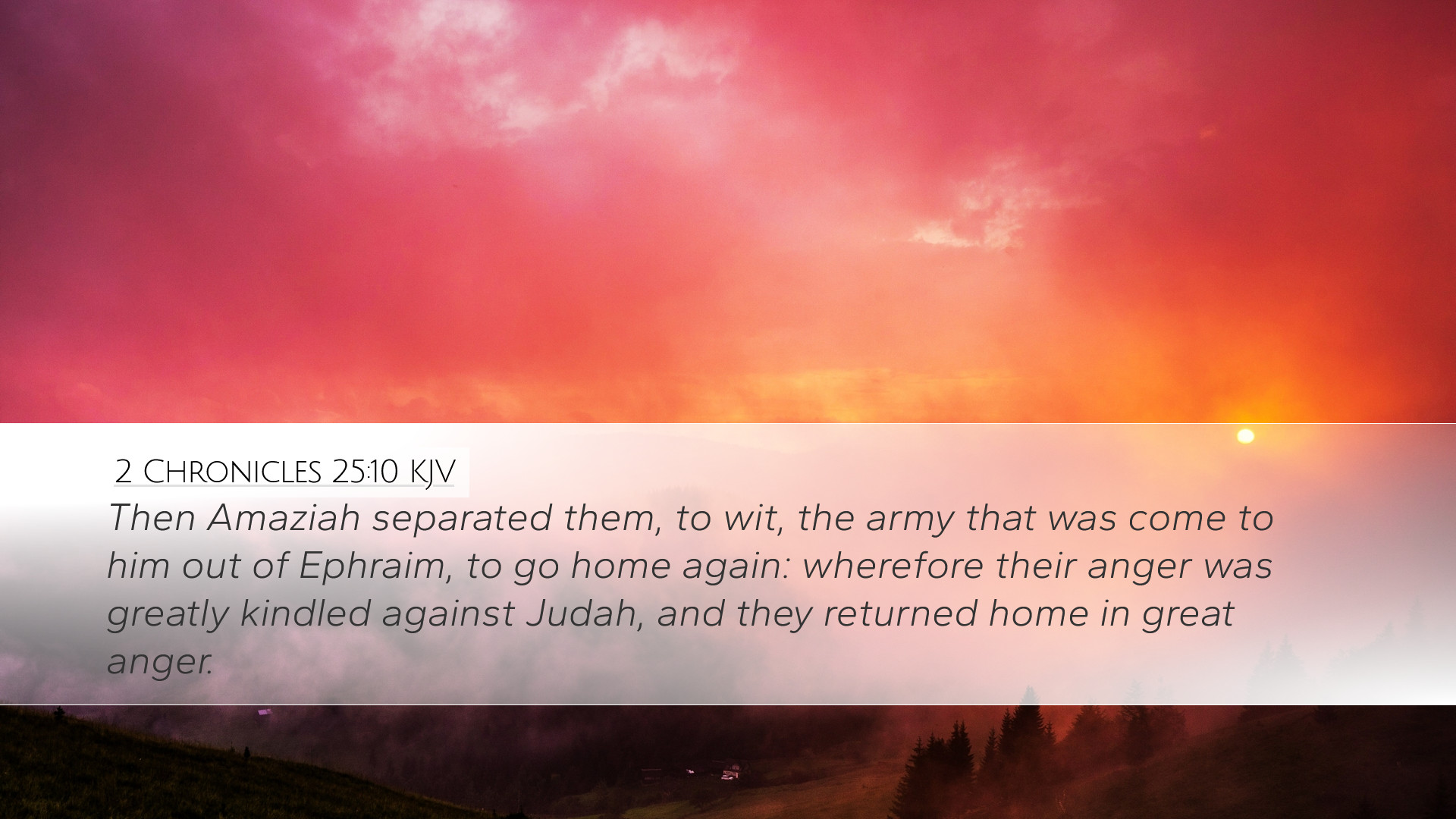Commentary on 2 Chronicles 25:10
Bible Verse: 2 Chronicles 25:10 (KJV): “Then Amaziah separated them, to wit, the army that was come to him out of Ephraim, to go home again: wherefore their anger was greatly kindled against Judah, and they returned home in great anger.”
Introduction
This verse presents a pivotal moment in the reign of King Amaziah of Judah, showcasing the complexities of leadership, the tension between military alliances, and the consequences of disobedience to divine principles. The various public domain commentaries, including those by Matthew Henry, Albert Barnes, and Adam Clarke, provide extensive insights into the implications of this verse for both historical understanding and its theological implications.
Contextual Background
The broader narrative in 2 Chronicles details the reign of Amaziah, who initially follows the ways of the Lord but eventually falls into folly. This moment occurs after he enlists mercenary troops from the northern kingdom of Israel to bolster his forces for a campaign against the Edomites. However, a crucial intervention by a prophet warns Amaziah that relying on these mercenaries is not God’s will.
Commentary Insights
1. The Importance of Obedience
Matthew Henry emphasizes that Amaziah's decision to send the troops home reflects his commitment to obey the divine counsel he received. Henry articulates a vital lesson about the necessity of making difficult decisions aligned with God’s guidance, even at the expense of temporary alliances and support.
2. The Consequences of Actions
Albert Barnes notes that Amaziah's choice to send away the mercenaries led to a significant fallout. He indicates that the anger of the Ephraimite troops was not merely personal but indicative of a larger spiritual misunderstanding that can occur when human ambition collides with divine will. The response of the mercenary troops serves as a reminder that our decisions can lead to anger and strife in those who do not understand God’s ordering of events.
3. Divine Sovereignty
Adam Clarke provides an in-depth analysis of the divine sovereignty at play here. He suggests that Amaziah’s reliance on a foreign army was a deviation from trust in God. Clarke posits that the returning soldiers’ anger illustrates the broader implications of ignoring God’s sovereignty—leading not only to personal strife but also affecting the relationship between neighboring nations.
4. Political and Spiritual Ramifications
While Amaziah’s actions were politically motivated, they bore spiritual ramifications. All three commentators agree that his decision to send the troops back was a crucial turning point. By prioritizing divine commands over political expediency, Amaziah was called to instigate a lesson in faith and courage amidst adversity, which is often applicable in both congregational leadership and personal faith journeys.
Lessons for Today
The commentary on this verse presents several key lessons for contemporary faith leaders, theologians, and students:
- The Cost of Disobedience: Like Amaziah, leaders today are faced with choices that often demand a separation from popular opinion or expedient alliances in favor of fidelity to God’s commandments.
- The Nature of Anger: Reflecting on the anger of the Ephraimites teaches about the human emotional response when left out of decisions that affect them. It reminds readers to consider the feelings and understandings of others in leadership positions.
- The Assurance of God’s Provision: By trusting in divine guidance rather than human resources, leaders can find greater assurance in God’s sovereignty over their circumstances.
- The Clash of Kingdoms: There is a significant reminder here of the tensions that arise from conflicting national loyalties and faith convictions, which requires careful navigation in contemporary society.
Conclusion
2 Chronicles 25:10 serves as a reminder of the importance of fidelity to God’s will over the transient allure of political or military might. Histories of Israel and Judah are littered with examples of leadership decisions that have profound spiritual implications. The combination of insights from Matthew Henry, Albert Barnes, and Adam Clarke illuminate the complexities of Amaziah's reign and the pressing need for faithfulness in leadership, urging today’s leaders to reflect on the weight of their choices in the light of divine purpose.


